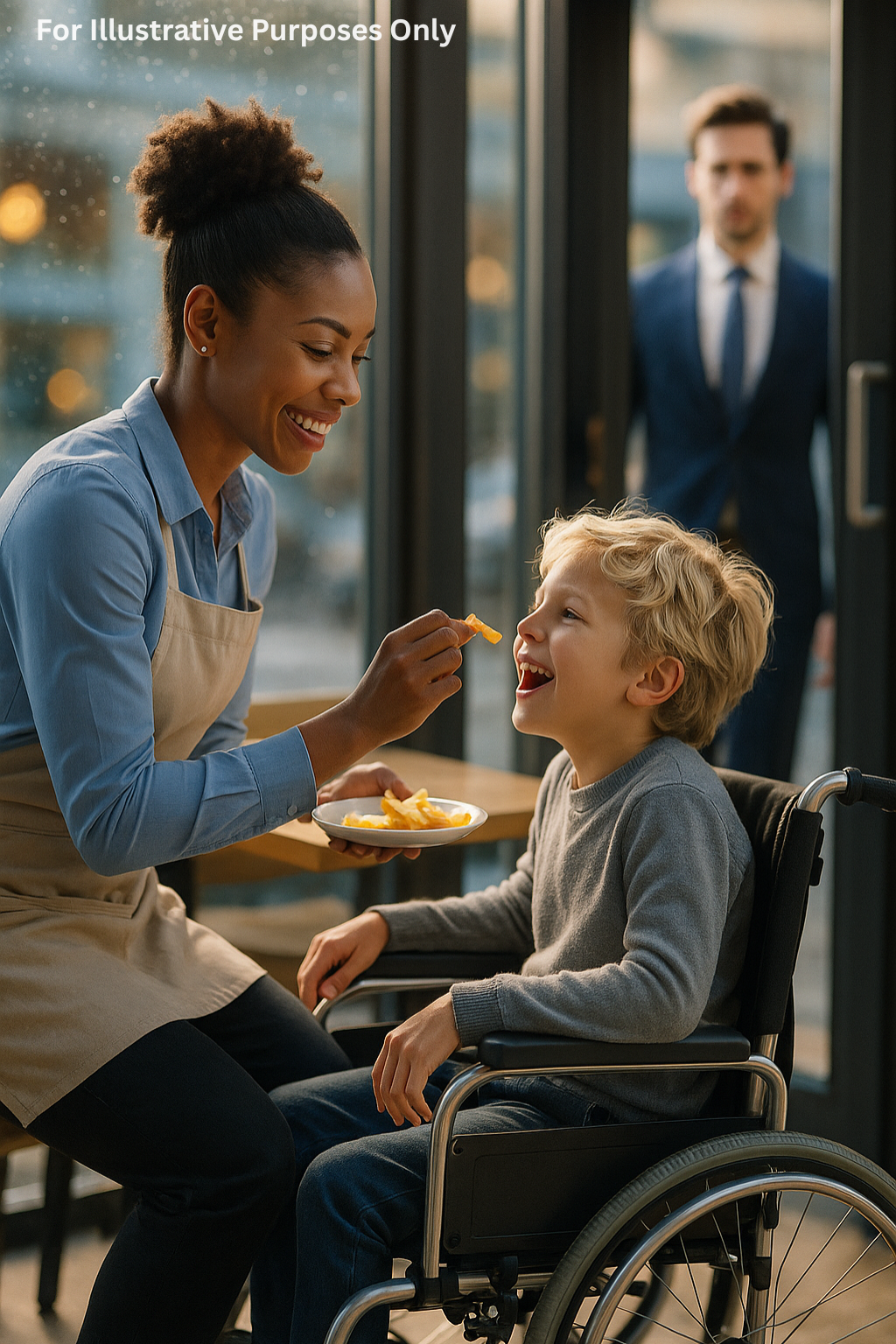Billionaire Dad Watches Waitress Feed His Disabled Son – And Changes Her Life Forever!
The rain had turned the café windows into a soft watercolor. A lunchtime rush hummed in the background—cups clinking, steam hissing, orders called out in quick shorthand. Maya, the newest waitress on the floor, tightened her beige apron and balanced a plate of fries in one hand. That was when she noticed him: a boy with sky-blue eyes seated in a wheelchair, hair the color of late summer wheat, smiling at the drizzle as if it were confetti. Beside him stood a tall man in a navy suit—expensive, crisp, and somehow exhausted.
The man kept checking his phone, answering messages with the briskness of someone used to emergencies. The boy—Leo—watched the plate land in front of him. He tried to pick up a fry, his fingers stiff, the effort tiring. Maya’s heart tugged. She crouched so her eyes met his.
“Want a co-pilot?” she asked.
Leo’s smile widened. He nodded.
Maya pulled up a chair and, with the father’s soft “thank you,” began a tiny game. Each fry was a “rocket,” whooshing from the plate and landing gently. Leo giggled. The father, half in the doorway and half in the world of emails and investors and people who called him “sir,” paused. He should have looked away; he didn’t. Something about this easy kindness nailed him to the floor.
No one in the café recognized him. Not the barista frothing cappuccino, not the couple sharing an umbrella by the window. But if anyone had glanced twice, they might have recognized the face that appeared on magazine covers: Arman Khanna, tech billionaire, builder of companies, survivor of boardrooms. Today, he was simply a dad with too much on his mind and not enough sleep in his bones.
“Is it okay if I help?” Maya asked him.
“Please,” he said, voice low. “He’s had a rough morning.”
She kept her tone bright, never pitying. “Alright, Captain Leo, incoming rocket in three… two… one.” Leo opened his mouth, laughing around each bite.
Arman watched the ease with which Maya navigated the wheelchair, adjusted the angle of the plate to minimize effort, kept eye contact with Leo rather than with him. It wasn’t just service; it was presence. And it unlocked a square of peace inside him he didn’t know he’d been guarding.
When the plate was half empty, Maya turned to Arman. “If you angle the chair a little toward the light, it helps with focus. Works for my brother too.” She said it casually, like a weather update.
“You have a brother?”
“Zayd,” she said. “Cerebral palsy. He’s the reason I know more about adaptive utensils than I ever planned.” Her smile was small but steady. “He’s also the reason I don’t scare easily.”
Arman nodded. The truth was, he had been afraid since the accident that took Leo’s mother—afraid of hospitals and progress charts and all the ways love could suddenly feel like failure. He’d learned to win at work. Here, with his son’s therapy milestones and nutrition battles, he felt like a beginner.
Maya never rushed them. When Leo tired, she shifted conversation to him, never around him. She asked about his favorite song (apparently something with clapping), his favorite color (yellow), and whether the rain made the world louder or softer today (softer, he decided). She cut a fry into smaller pieces without making a production of it and placed a cup of warm water close to Leo’s dominant hand. “He might like dipping,” she offered.
He did.
By the time the plate was cleared and rain had thinned to a mist, Leo’s cheeks were pink with contentment. Maya wiped the table and told Leo he had the best space-pilot manners she’d seen all week. Arman thanked her again, fumbled for his wallet, and placed a folded note by the bill. He hesitated, then slid his business card under it, almost embarrassed.
“If you ever… if you’re ever looking for different work,” he murmured, “call me.”
Maya glanced at the card only after they left. The name made her blink. She tucked both note and card into her apron pocket and returned to the noise and bustle of the café, unsure why her heart beat so fast.
That night, she unfolded the note: Thank you for seeing my son. Under it was a tip far larger than her weekly rent. Generosity could feel heavy when you weren’t sure you deserved it. She set it aside and stared at the card. Something about the way he’d said “thank you”—as if gratitude itself was new territory—stayed with her.
Two days later, an unfamiliar number flashed on her phone. “Maya? This is Saira from Khanna Ventures. Mr. Khanna wondered if you could come by for a quick meeting. And… would you mind bringing coffee from your café? He says the cinnamon one.” Maya almost laughed. A billionaire who remembered a flavor—maybe empathy wasn’t rare, just quiet.
She went, clutching a cardboard tray like a passport. The lobby of Khanna Ventures was all light and glass, but the man who greeted her looked less intimidating than he had in the café. Without the rush of rain and alarms, he seemed simply human.
“I didn’t bring you here for a job interview,” Arman started, almost apologetic. “I brought you here because you were the first person in weeks who made Leo forget he was being brave. You made him just… be.”
Maya shifted, unsure. “I only fed him fries.”
“You fed him dignity.”
He asked about Zayd, about the part-time jobs stacked beside Maya’s dream of studying occupational therapy. She had dropped out after year one when medical bills rose and hours shrank. She insisted she wasn’t a hero, just a sister. He believed her—and still thought she deserved a chance.
“What if we partnered?” he asked. “Not charity. A promise. I’ll cover your tuition and a living stipend so Zayd’s care isn’t compromised. In return, you work with Leo’s therapists part-time and help us design a training program for restaurants on inclusive service. We’ll pilot it at one of our hospitality brands. You’ll lead it.”
Maya’s breath caught. The offer didn’t feel like a rescue; it felt like a door. “Why me?”
“Because the day I met you, three people served us. Only one met Leo where he was.”
She said yes, not because of the money, not even because of school, but because the proposal connected everything she loved—people, dignity, small practical changes that ripple outward.
The months that followed were a patchwork of hustles stitched into harmony. Classes in the evening. Mornings shadowing Leo’s therapists, learning the language of muscles and patience. Afternoons drafting training modules: clear menus for people with dyslexia, no-rush lanes for wheelchairs, staff scripts that centered the person rather than the disability. She built exercises that were simple and real—like practicing where to place a plate so a diner could reach it independently. She filmed short videos at the café with willing customers, laughter echoing through takes.
Arman watched the program take shape the way he watched a start-up gain traction—metrics, iterations, honest feedback. But there were moments that didn’t fit on a dashboard: Leo grinning when Maya taught him a new grip; Zayd visiting the office and being treated like the most important consultant in the room; Maya discovering that leadership felt like service with a wider radius.
The pilot launched in five restaurants first, then twenty. Reviews mentioned details most places forgot: staff who knelt to make eye contact, entryways held open without fuss, menus that made choices easier. Tips rose. So did loyalty. Inclusion turned out to be good for business—Arman knew it would be. What he hadn’t predicted was how it would change his own home. Leo’s world widened. So did Arman’s.
Two years later, the rain returned like a shy old friend. The café—now renovated with wider aisles and a lowered counter—buzzed with familiar warmth. A sign near the door read Little Steps: Every Small Change Matters, the name of Maya’s nonprofit, funded by an endowment Arman had seeded but she now ran independently. Her scholarship program trained service workers across the city. Her research paper on dignity-centered design was being cited in hospitality courses.
Arman arrived with Leo, who could now maneuver his chair with more confidence. He still loved fries. Maya still launched “rockets.” Only now, other staff launched them too, and not just for Leo. The changes had outgrown their origin story.
“You changed my life,” Maya told Arman once, a little shy.
He shook his head. “You changed mine first.”
He had learned to step away from the phone when Leo needed him, to ask for help without feeling it was a loss. He had learned that money could accelerate kindness but never replace it. And he had learned that sometimes the best investments begin at a table where someone simply pays attention.
On the wall, a photo caught a rain-washed afternoon: a waitress kneeling so a boy could see her eyes, a father pausing in the doorway, watching something far rarer than luck. Underneath, a caption read: Kindness is the first accessible design.
People came to the café for coffee, for cinnamon and sunshine on gloomy days. But they left with something else—a new way to look at one another. The billionaire didn’t wear his wealth like armor anymore, and the waitress didn’t hide her ambition like a secret. Together, they’d built a bridge that anyone could cross, one small change at a time.
And if you asked Leo what changed first, he’d grin and say, “The fries learned how to fly.”


